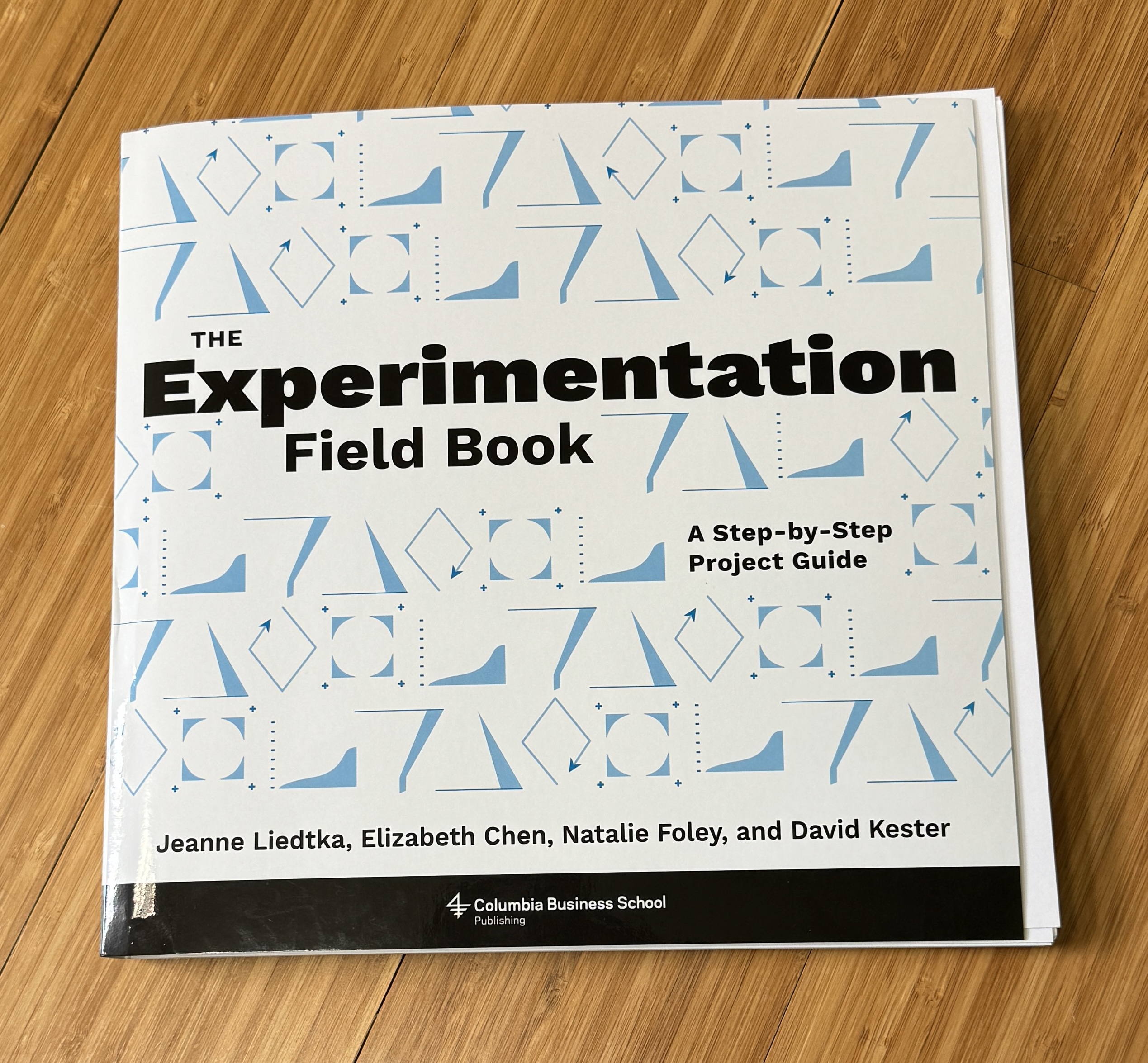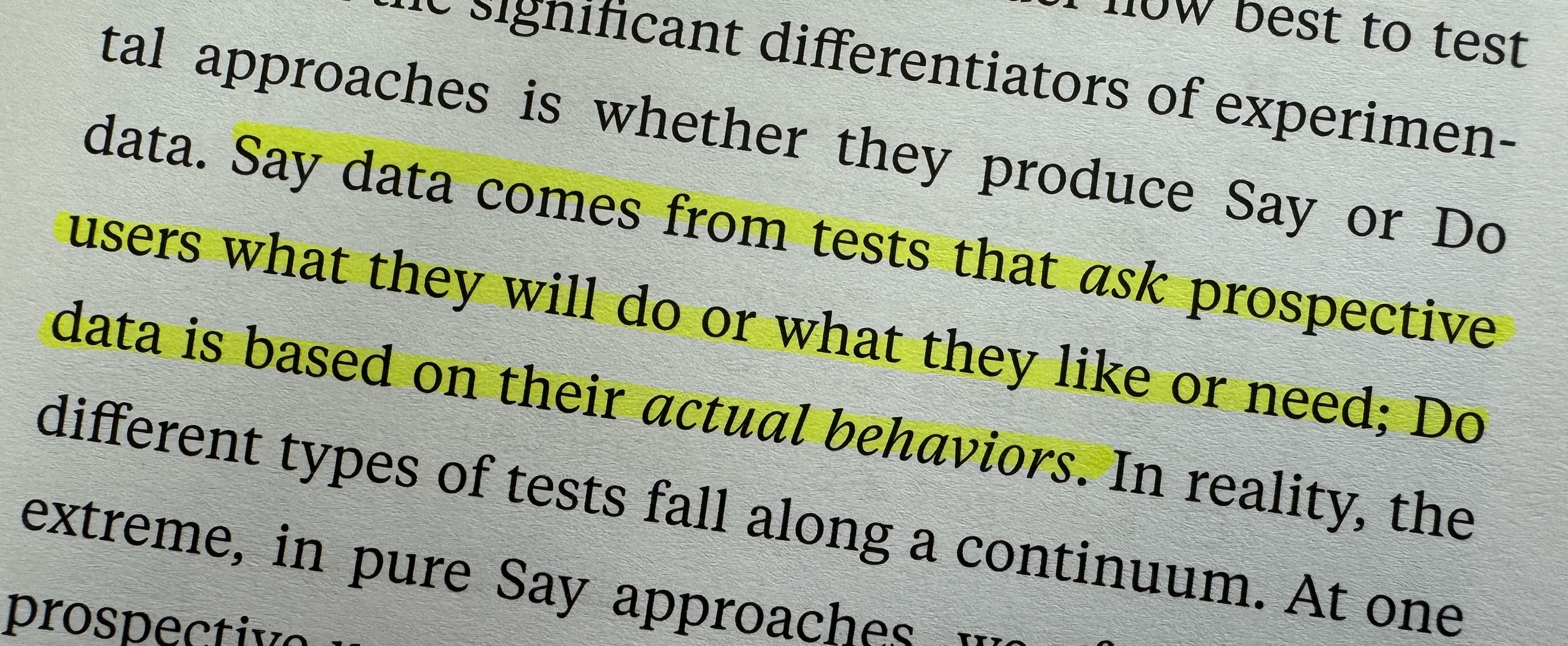What We're Reading Now
Better Experiments for Better Learning
30 January 2024
Rachel read a hot-off-the-presses The Experimentation Field Book: A Step-by-Step Project Guide by Jeanne Liedtka, Elizabeth Chen, Natalie Foley, and David Kester and considered how better experimentation might lead to better learning.
Tags: design thinking, experimentation, learning, rachel read
How do you learn? It’s not a rhetorical question. You might say, “I read a book,” or “I search LinkedIn Learning,” or “I check out my local community college course catalog.” And it’s true – all of those are structured, formal ways that people learn things. I’d argue, though, that much of our life’s learning emerges through experimentation. Indeed, as authors (and colleagues) Jeanne Liedtka, Elizabeth Chen, Natalie Foley, and David Kester write in the introduction of The Experimentation Field Book, “…many people run experiments every day outside of science labs. Long before you were learning about experiments in school, your toddler brain was experimenting as a primary method of learning: If I stack blocks like this, they don’t fall over. If I put my fingers near the door, I can get hurt when it shuts.”

One (big) challenge when it comes to experimentation as a path to learning is that many (most) of us are sloppy scientists. We don’t clearly state our hypotheses. We extrapolate from tangential information. We don’t run any actual tests or document our observations when we do. As a result, we often “learn” things that simply aren’t true, and that can lead to expensive, embarrassing, and painful lessons later.
Thus, The Experimentation Field Book, with a pragmatic five-step process providing instruction (and templates) to help us become more skilled at the what and how of testing and learning. Although the tools and examples are predominantly presented in the context of innovation projects, I found myself thinking about their relevance to other everyday things: Relationships. Health. Happiness. Life. The basics of experimentation apply pretty universally:
• What are you trying to achieve?
• What solution do you imagine might work?
• What assumptions are you making about that solution?
• What evidence might test those assumptions?
• How will you gather and interpret that evidence?
• How will you incorporate and apply that learning?

Much of the time, we do this subconsciously, although it’s easy to fall into a trap of skipping key questions or stopping with incomplete evidence. I was particularly struck by the authors’ description of “say” and “do” data. As they write, “Say data comes from tests that ask prospective users what they will do or what they like or need; Do data is based on their actual behaviors.” Translation: “say” data results from questions like, “If I get some arugula, will you eat salads for lunch?” while “do” data comes after watching said arugula wilt and get slimy in the vegetable drawer. Of course, “say” data is useful to a point; it makes sense to solicit input on the grocery list. Problems result, however, when we treat “say” data as absolute and don’t update our learning or conclusions based on subsequent “do” data. (That’s the equivalent of throwing out the slimy stuff, continuing to buy arugula every week, and then complaining, “But you said you’d eat salad!”)
All too often, whether it’s in the context of our organizational policies, team dynamics, or simply the grocery list, we neglect the importance of “do” data and defer to the sometimes easier and clearer “say” data as our sole evidence, leading to incomplete conclusions and slowing our real learning. With some practical tools from the Field Book and a little inspiration from Lessons in Chemistry, maybe we can all be better at using experiments to make every day a little better with a little more learning.







Comments
Our Comment Policy:
Our blog posts are only half of the conversation. What our readers have to say is equally important to us, and we're grateful for all the comments that continue the dialog.
To ensure that the discussion here is as useful as possible to all of our readers, please be respectful of our contributors and refrain from harassing, threatening and/or vulgar language. We reserve the right to screen and remove any comments from the site. If you have a question about a comment or want to discuss our policy, please contact us. We'll talk it over.
jeanne Liedtka
Jan 30, 2024
As always, you take my thinking to a new level, Rachel. Wilted arugula and sloppy scientists are going to be new go to images!
Allison Partners
Jan 30, 2024
Thanks, Jeanne! I’m always one for a good visual metaphor - you taught me well.